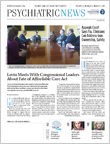The issue of whether and when to report abuse is a frequent inquiry to the Allied World Risk Management Line. These calls include questions about reporting possible abuse involving children, elders, persons with disabilities, and incidents of domestic violence. The answer of whether to report may not always be clear-cut and depends on the state where you practice.
Disclosures can occur in any area of psychiatric practice (in the hospital system, outpatient practice, and collaborative care practice). If you are faced with an issue of whether you are required to report, many questions may arise, such as these:
•
Do I need to tell the patient/family that I am submitting a report?
•
Is the reporter’s name kept confidential from patient/family/alleged abuser?
•
How will reporting abuse impact my therapeutic relationship with the patient/family?
•
What if I am not sure whether the report is accurate?
•
Do I need to report abuse that may have occurred many years ago when the patient was a minor but is now an adult?
•
Can I face potential liability risk if I submit a report?
There are numerous variations among states regarding what types of abuse must be reported and when and how it should be reported. For example, while all states require reporting of child abuse, some states may also require you to report child abuse that occurred many years earlier but was not disclosed until years later when the patient is an adult. The purpose is to protect other children who may be at risk for abuse by virtue of contact with the abuser.
In addition, there may also be variations among states about when to report suspected abuse against elders and disabled persons, which may not only include physical abuse, but also instances of financial exploitation or placing elders at risk. Thus, it is important to be aware of the applicable rules within your state prior to encountering the issue of whether you are required to report or not.
It is also important to know your state law for reporting domestic violence incidents, including penalties for failing to report. As an example, a recent California case involved a provider who was sued because of claims alleging a failure to report domestic abuse that resulted in the patient’s death. The California Court of Appeals ultimately dismissed the case on the grounds that there was insufficient proof that a report would have changed the outcome.
Here are some risk management principles to consider regarding state reporting requirements:
•
As a part of your ongoing assessment and treatment, inquire about whether the patient feels safe, discuss abuse, and ensure thorough documentation in the patient’s medical record.
•
Understand your state’s laws on mandatory reporting for children, elderly people, disabled people, and domestic abuse.
•
Understand your state’s laws regarding discussing weapons/firearms in the home. This is particularly important if a patient discloses abuse and there is access to weapons in the home.
•
Check your state’s board of medicine website for information on mandatory reporting.
•
There may be penalties for failing to report, and there may also be immunity from liability if you do. It is important to be aware of how your state views these issues.
•
State agencies that collect reports can also be very helpful. Providing them with a hypothetical issue and the question of whether you should report is another option.
•
Should you have questions, it is important to discuss them with an attorney or risk management professional.
Allied World, through its subsidiaries, is a global provider of innovative property, casualty, and specialty insurance and reinsurance solutions. Allied World is the APA-endorsed carrier for the professional liability program through its strategic relationship with the American Professional Agency Inc., the Program Administrator. This information is provided as a risk management resource and should not be construed as legal, technical, or clinical advice. Consult your professional advisors or legal counsel for guidance on issues specific to you. This material may not be reproduced without the permission of Allied World. Risk management services are provided by or arranged through AWAC Services Company, a member company of Allied World. ■

